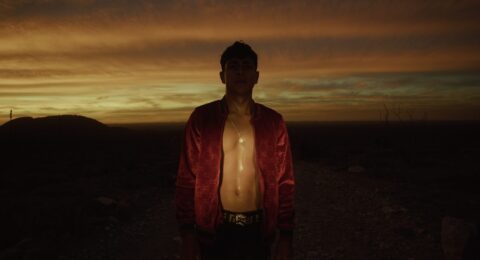Queer road cinema carries a long and complicated legacy — one shaped as much by desire as by danger. David Pablos’ riveting new film En el camino (2025), which follows Veneno (Víctor Miguel), a young drifter on the run with a bag of drugs, and Muñeco (Osvaldo Sánchez), an older truck driver who gives him a ride, draws from this lineage while forging something entirely its own. Pablos has crafted a modern erotic drama centred on working-class men that, despite its charged sensuality, deliberately avoids the easy route of fetishising rough trade. Instead, the film offers a fascinating — and at times deeply disturbing — journey through Northern Mexico’s highways and truck stops, all while grounding its story in the emotional complexity of its characters and their troubled pasts.
The Queer Lion-winning film opens on a threatening note: a young man stands alone in the desert as gasoline is poured over his body. We hear the sharp strike of a match — and then, the title card hits. It’s the first of many haunting images that recur throughout the film, which unfolds in a mostly linear fashion but is punctuated by fragmented flashbacks. These glimpses into the past suggest both the weight of Veneno’s history and the perils that lie ahead.
After being stranded by an older trucker with silver sideburns who offers hot sex and an empty promise of food, Veneno meets Muñeco at a truck stop. Though initially reluctant to help, Muñeco is quickly persuaded when Veneno offers him some cocaine. From there, the first act hums with erotic tension; it’s clear something is building between the two men. They become drug-dealing partners, evading the offscreen eyes of the drug cartels, then (briefly) lovers and comrades on the open road.
From there, En el camino taps into the restless energy of queer road cinema while updating the playbook — folding in contemporary Mexican politics and a fresh look at masculine expectation. Pablos toys with familiar archetypes — the drifter, the truck driver, the cowboy — yet humanises them. The drifter and the trucker are presented not as fantasies, but as fully realised men with messy lives and tangled emotions. The cowboy, meanwhile, emerges as something more sinister: a shadowy nightmare in human form, chasing Veneno for reasons the film keeps deliberately veiled until the end of the second act.
The narrative pushes forward, but now and then it pulls us back — interrupted by eerie memories and flashbacks. We see a man running through the desert engulfed in flames; we see the faceless cowboy surrounded by a group of twinks. These images arrive without context besides memories in Veneno’s head, but invite the viewer to try and slowly piece together the mystery. Slowly, the buried histories of these two men — especially the pain tied to absent fatherhood — come into focus. Pablos lets all this tension simmer for an hour — and when the truth of Veneno’s situation finally emerges, it hits like a kick in the balls.
En el camino shares ground with essential ’90s road films like The Living End (Gregg Araki, 1992) and Thelma & Louise (Ridley Scott, 1991); two stories that dismantle the myth of the open road as a path to freedom. In each, movement offers no real escape — only a suspended state between flight and death. The Living End follows two HIV-positive men tearing through a country that has already written them off. Their self-destructive journey is anarchic and defiant, and it’s clear throughout that we are careening toward an unhappy ending. Thelma & Louise, not a queer film but loaded with queer subtext, offers an escape from patriarchy that can only end in a suspended moment of freedom — one that cannot exist within the world they flee. Pablos’ characters are equally cornered by memory, addiction, failure and the constant threat of violence. The road stretches on, but there is no comfortable destination — only motion, with the past in hot pursuit.
The film’s push-pull dynamic between erotic fantasy and emotional reality becomes even clearer when considered alongside Tim Kincaid’s Working Man Trilogy – Kansas City Trucking Co., (1976), El Paso Wrecking Corp (1977), and L.A. Tool & Die (1979). While Pablos resists fetishisation, Kincaid leans fully into it, revelling in eroticised images of working-class masculinity built around physical labour and fleeting encounters.
Yet beneath the surface of these pornographic narratives — and through fragmented cinematography and episodic form — something deeper takes shape. Kincaid’s truckers, mechanics, gardeners and drifters exist in a charged space between stylised fantasy and (at the time) a new vision of gay male identity that pushed back against the feminised “sissy” images of the time. These men aren’t soft. Neither are they passive — ready to get down anywhere without shame or push back against the forces that underestimate them (like when Hank, played by Richard Locke, kicks a homophobe’s ass in the third film while delivering the timeless line: “If there’s anything I like more than sucking cock, it’s kicking ass!“)
By the trilogy’s end, even a rough and tough character like Hank begins to open up, hinting at the possibility of an emotionally rich gay life beyond the highway grind. Similarly, En el camino allows its own hardened men to soften too — just slightly.
Brace yourself: En el camino’s ugly climax is graphic and terrifying, made more devastating by the way the relationship between Veneno and Muñeco turns protective, even paternal, as long-buried masculine trauma begins to surface. When the past finally crashes into the present, it brings clarity, but no relief. In the end, no one walks away clean, yet something tender still breaks through.
Editor-at-large Jared loves movies and lives with Kiki in Berlin.




